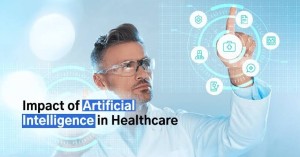
The Impact of Artificial Intelligence on Healthcare
The researchers have established that Artificial Intelligence has advanced its coverage across more fields, and the healthcare field is not exempted. The main subfields of AI that can be mentioned include machine learning, natural language processing, and robotics, with the most significant use in the healthcare industry in enhancing patients’ results, access to efficient/affordable healthcare, and improved health outcomes. This paper mainly concentrates with the purpose of examining the impacts which Artificial Intelligence in the healthcare sector has for the greatest benefit, drawback and chances that are being envisioned for the future of this technology.
There are a large number of AI applications for healthcare, starting from diagnostic to the care and management of patients. Key applications include deep learning techniques help in identifying the disease in the images like X-ray, CT-scan and MRI entirely automated with high accuracy. The advanced image analyzing aid devices help the radiologist in diagnosing such illnesses as tumor, fracture, and infection.
Predictive Analytics: AI is used to apply data-driven approaches in identifying patients’ risk factors so early reporting and follow-up care with treatment plans can be initiated. Screening methods can anticipate potentials for development of further problems, readmission probability and futher course of the disease.
AI determines the treatments through evaluating genes of an individual and patient history since it focuses on the genetic make up of a patient as well as the lifestyle of the patient. It also increases the effectiveness of the treatment procedure and minimizes side effects.
There are surgical robots that use AI to manipulate precision and control that can hardly be offered by a human surgeon. These systems enhance the performance of operations, shorten the healing periods, and decrease adverse effects.
Advancements in the AI technology enables the development of chatbots and virtual assistants that can assist the patients, medical doctors, and medical center 24/7 providing medical recommendations; appointments’ scheduling; and medication prescription and compliance, respectively.
The integration of AI in healthcare offers numerous benefits, including:The integration of AI in healthcare offers numerous benefits, including:
They supplement the conduct of diagnosis and treatment regimens by minimizing the chances of human mistakes and bringing out the best results in the patient.
It eliminates the Office barriers, enabling efficiency in Performing Operations, thus cutting health costs. Predictive analytics also assist in the utilization of resources in addition to avoiding procedures not contributing to risk assessment.
Regarding health care, the use of AI can be described by the analysis of big data as to the shape of the patient’s health condition; nevertheless, the question of safeguards is still relevant in this field. Of course, main considerations are on the particular regulation, such as Health Insurance Portability and Accountability Act. Hence, there are several difficulties that one has to take into consideration each time the AI solutions are being implemented in the given environment and these are; High implementation cost; AI solutions compatibility with HC IT system; Standardization issues The AI solutions have to be integrated into HC IT systems in-for deployment.
When designed, algorithms used in AI are capable of carrying biases from the training data and hence AI prefers to be unfair to the minorities in health care. Thus, one could likely agree with the idea that there should be fair algorithms.
this therefore means that while there is increasing trends in regulation of AI in the health care industry, regulation in this aspect is still very indefinite. Hazardous scenarios in the embryonic and the dependent on AI technologies are suggested here to require multiple models to be set up to prevent the occurrence of such adverse situations and then manage them.
- Ethical Considerations: Based on the use of AI in decision making in health care sub decisions made present an ethical dilemma of who has the right to make a decision and if if is ethical for a machine to make decisions that used to be made by a health care professional.
AI in health care is relatively novel, but, at the same time, promising, and thus, it will be presumably continued and further advanced. Emerging trends include:
Precision medicine is probably one of the fields where AI will always be immensely useful since patients will be supplied with individual approaches based on the outcomes of the analysis of numerous factors; for instance, genomics, life stories, and environment.
Health care is one of the sectors that will fully embrace Artificial Intelligence and will have numerous advantages like high accuracy, low cost, and improved satisfaction among patients. However, the implementation of AI also has its drawbacks; among them we can mention threats to the data confidentiality, compatibility with other programs and moral dilemmas. In order to overcome all these challenges, there is a need to come up with strict regulations and ethical standards coupled with research and development to assist in the achievement of the benefits of AI in the healthcare sector. AI being an ever-growing technology, envisions to transform the current and future healthcare systems delivering efficient, patient centric and globalized solutions.
